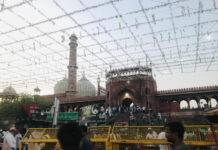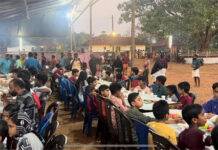The Tablighi Jamaat event held in Delhi in the month of March surely gained widespread negative publicity and was linked to a severe spread of coronavirus in the country. The government engaged in quarantining thousands of people who attend the Jamaat across the country in a bid to contain and control the spread of the coronavirus infection.
A hostile media campaign centred on anti-Muslim rhetoric filled up both the media as well as the social media and the Muslim community was once again at the centre of widespread hatred and social boycott pouring in from different corners of the society.
This was evident enough in the kinds of hashtags that became popular such as #CoronaJihad trending for days on Twitter. The event began to be called “corona terrorism”, hinting at the Islamophobia underlining it all.
Thousands of people who attended the religious congregation that was subsequently linked to corona, were sent to quarantine facilities in different parts of the country. Most of these facilities are composed of makeshift rooms lacking fans and are more often than not extremely congested and humid. Those who are living in these quarantine facilities are therefore having immense problems as far as observing the fast during the ongoing holy Islamic month of Ramadan is concerned.
These inmates are facing immense difficulties due to the lack of food for suhoor( a pre-dawn meal during the Ramadan and Iftar( a meal consumed after the sunset to mark the breaking of the fast for the day).
Many inmates complain that not having arrangements for food at these appropriate times is making the observation of the fast a particularly difficult proposition for the Muslims housed in these quarantine camps.
Underlining the poor condition of quarantine centres in Delhi, the Delhi Minorities Chairman Zafarul Islam Khan had demanded that those who had been kept at these centres for more than 14 days and had been tested negative should be allowed to return back home. He also alleged that the facilities for food and medicine were extremely poor and needed the urgent attention of the government.
Reports from earlier this month also suggested that two people who had attended the March event of the Jamaat and had been kept in a quarantine centre in Delhi had died due to negligence. These two people were staying at the Wazirabad quarantine centre and died to unavailability of medication and food.
Thousands of people who had been to the Jamaat are currently living in quarantine shelters with meagre food and medication and often in congested and ill-ventilated spaces. But many of those who had been infected by the virus but have now recovered volunteered to donate plasma for the treatment of other coronavirus patients. A large number of Jamaat participants came out to donate plasma after the Jamaat Head Muhammad Saad Khandhlawi released a statement in which he appealed to the Jamaat members to donate their blood plasma.
The plasma can only be collected from people who have tested positive and have recovered. The plasma becomes an important tool in the fight against corona because people who have recovered from the virus may develop antibodies in their blood, called convalescent plasma, that could be used to fight the coronavirus infection. However, many scientific reports have said that such a theory is baseless. In the aftermath of a large number of Jamaat members coming forward to donate their plasma, media has often hailed them as “super saviours”, weeks after calling them “super spreaders”.














